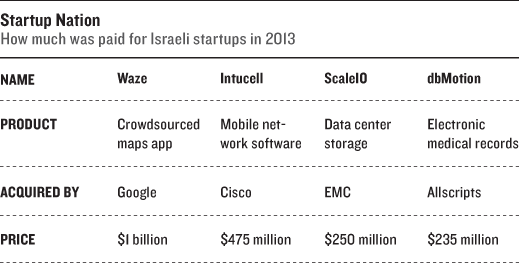Israel’s Military-Entrepreneurial Complex Owns Big Data
Technology to track enemies powers Israel’s move into commercial prediction software.
Two years ago, a half-dozen programmers and entrepreneurs started working together in a Tel Aviv basement to create one of Israel’s 5,000 high-tech companies. It was a stealth company, but these 20-somethings were used to secrecy. Most had served together in the same military intelligence unit of the Israel Defense Forces.
In the army, they worked on algorithms that could predict the behavior of Israel’s enemies by plucking patterns from intercepted signals. Their new company was based on much the same idea–but it aimed to guess the preferences of consumers. It was called Any.Do. By the end of 2012 their productivity app for smartphones was one of the most popular downloads worldwide.
Each year, Israel’s military puts thousands of teenagers through technical courses, melds them into ready-made teams, and then graduates them into a country that attracts more venture capital investment per person than any in the world. The result, according to the 2009 book Start-Up Nation, is an “economic miracle” that’s seen high-tech exports balloon to $25 billion per year, about a quarter of Israel’s exports.
Israel’s military-entrepreneurial complex has lent it a particular edge in analytics and big data. “Their main expertise was to extract intent from messages that are being sent across different communications channels,” says Any.Do CEO Omer Perchik of his team. “What we’re building is a kind of action engine where we extract the user’s intent from his tasks and enable him to actually execute those tasks from within his mobile device.”
Military service in Israel is generally compulsory, lasting two or more years. Many would-be entrepreneurs apply to the IDF’s computer training academy, known as Mamram. Located at a base outside Tel Aviv, it acts a bit like a school for startups, teaching programming and project management to cadets in olive-green uniforms. Young hackers with proven skills get recruited by specialized intelligence units such as Matzov, the army’s cybersecurity division, or units involved in signals intelligence and eavesdropping.

“What happens in the military is we take these really bright young 18-year-olds and say: Here’s a data center the size of Google and Facebook combined. Go do something mission critical,” says Michael Eisenberg, a general partner at the venture capital firm Benchmark Capital. “Now they are spilling out of the army, and we have the highest and best concentration in Israel of big-data engineers and analysts anywhere in the world.”...MORE